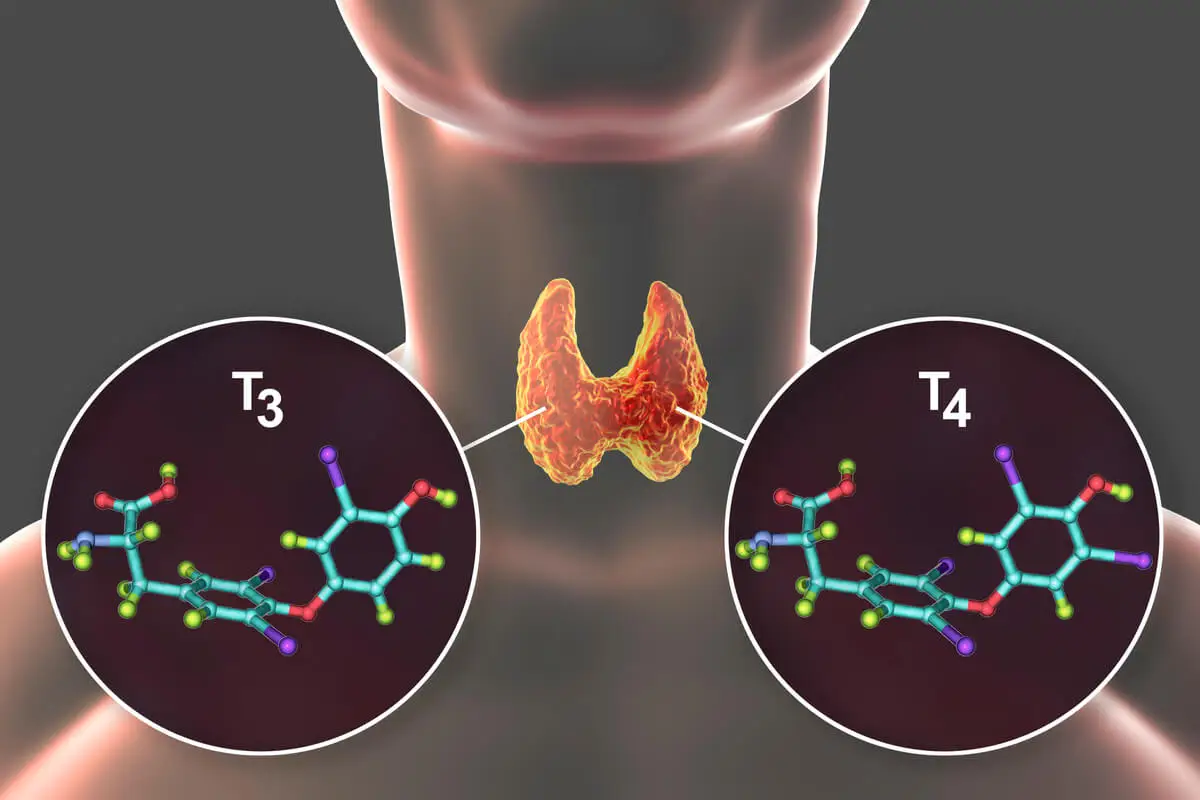11 Symptoms that Indicate You Need Hormone Testing

The endocrine system is a network of organs and glands specialized in the secretion of hormones in the human body. Hormonal imbalances greatly affect the quality of life and often have serious long-term consequences. Here are 11 symptoms that indicate that you need hormone testing.
Hormones are chemicals released into the bloodstream from the endocrine glands. They’re actively involved in metabolism, reproduction, sleep, appetite, mood, and in controlling the functioning of all vital organs.
Currently, diabetes, hypothyroidism, and dyslipidemias are the main endocrine disorders in older adults, according to studies. In most cases, these alterations produce early symptoms that shouldn’t go unnoticed and that indicate that you need to go to the doctor and get hormonal tests.
Causes of hormonal imbalance
Endocrine diseases are the result of an excess or deficit in the production of hormones. They usually appear due to a malfunction of specialized glands or damage to their structure. Such is the case of the pancreas, thyroid, adrenal gland, ovaries, and testicles.
A classic example is diabetes mellitus, in which the pancreas doesn’t produce enough insulin to regulate blood sugar levels. In Spain, research estimates a prevalence of type 2 diabetes of up to 18.7% and of type 1 diabetes of up to 0.1%.
Other causes of hormonal imbalance are as follows:
- Hypothyroidism
- Hyperthyroidism
- Cushing’s syndrome
- Hypogonadism
- Polycystic ovary syndrome
- Hyperprolactinemia
- Addison’s disease
- Diabetes insipidus
Risk factors
The origin of hormonal alterations is multifactorial, with genetics being a key factor in their occurrence. Similarly, there are several conditions that increase the risk of endocrine diseases:
- Obesity and sedentary lifestyle
- Diets rich in fats and sugars
- Alcohol and smoking
- Hormone replacement therapy
- Chemotherapy and medications, such as glucocorticoids
- Autoimmune diseases
- Excessive stress.

The most common symptoms that tell you that you need hormone testing
The manifestations of endocrine disruptions vary depending on which hormones or glands aren’t working properly. Some of the typical symptoms in men and women that indicate you need hormone testing are as follows.
We think you may be interested in reading this, too: Types of Hormones: Which Are the Most Important?
1. Excessive thirst and frequent urination
Persistent need for fluids and increased urinary frequency are called polydipsia and polyuria, respectively. These are classic symptoms in people with diabetes mellitus. In adults, they usually occur in the early stages of the disease, while in children, they take longer to appear.
On the other hand, polydipsia and polyuria are also characteristic signs of diabetes insipidus due to the kidney’s inability to retain urine and the loss of large volumes of fluid, according to studies. These disturbances can lead to bedwetting in young children during sleep.
2. Weight gain or weight loss
Weight gain is a common symptom in people with hormonal problems. In most cases, it’s related to high levels of estrogen and cortisol, as well as insufficient production of thyroid hormones. These alterations favor fat accumulation.
In addition, resistance to insulin action in people with type 2 diabetes increases weight gain and makes it difficult to lose weight by usual methods. On the other hand, unexplained weight loss can be attributed to an overactive thyroid or hyperthyroidism, in which there is increased metabolism and high catabolism of muscle mass.
3. Increased appetite or loss of appetite
Changes in appetite are a symptom that should not be taken lightly and tell you that you need hormonal testing. The increased and uncontrollable desire to eat is called hyperphagia or polyphagia.
This manifestation is common in the following entities:
- Diabetes
- hyperthyroidism
- Graves’ disease
- Hypoglycemia
- Premenstrual syndrome
On the other hand, loss or decreased appetite is known as hyporexia. This symptom usually appears in some people with Type 1 diabetes, as well as in patients with tumors at the level of the pituitary or hypothalamus.
Like this article? You may also like to read: Which Hormones Influence the Menstrual Cycle?
4. Chronic acne is a sign you may need hormone testing
Acne is a dermatological manifestation associated with hormonal changes, being frequent in adolescence. In general, high levels of androgens, such as testosterone, tend to trigger or worsen acne.
Some causes of this sign are polycystic ovary syndrome, insulin resistance, and congenital adrenal hyperplasia, according to research. In women, hormonal imbalance is responsible for the appearance of acne before menstruation.
5. Fatigue and extreme tiredness
Fatigue is one of the main manifestations of thyroid hormone deficiency. People with hypothyroidism often present exaggerated fatigue that prevents them from leading a normal day.
In addition, these patients often have high levels of stress, nervousness, and anxiety that cause difficulty sleeping and promote fatigue. This symptom also appears in hypercortisolism, dyslipidemia, and diabetes.
6. Exaggerated sensitivity to cold or heat
Variations in temperature sensitivity often appear in cases of thyroid dysfunction. Research affirms that in cases of hypothyroidism, people often report feeling cold, even in summer, so they are always warmer than is appropriate for the time of year.
The opposite is true in hyperthyroidism, where patients report intolerance to heat and increased sweating under normal conditions. In some women, this symptom intensifies before or during menstruation.
7. Hair loss
In general, it’s normal for people to lose some hair every day as part of natural scalp regeneration. However, excessive and persistent hair loss is a warning sign called alopecia. This hair loss can be patchy, diffused, or generalized.
Hormonal imbalances are one of the most common causes of alopecia. Some of the disorders involved are hyperthyroidism, Cushing’s syndrome, and hyperandrogenism. Similarly, hair loss is possible during menopause and perimenopause.
8. Hot flashes and night sweats
Hot flashes, also called hot flashes, are a frequent manifestation during the transition period to menopause or climacteric. Studies affirm that this vasomotor symptom is the result of estrogen deficiency in women and appears in up to 80% of menopausal women.
In most cases, hot flashes are associated with night sweats and reddening of the skin, followed by a drop in temperature and an increase in heart rate. They usually last from a few minutes to several hours, and more than two crises may occur in a day.
9. Digestive problems are a sign you may need hormone testing
Thyroid disorders can cause changes in the functioning of the gastrointestinal system. In hypothyroidism, people may present slowing of intestinal transit, constipation, and gastritis. On the other hand, the excess of thyroid hormones favors the appearance of diarrhea.
Similarly, the imbalance in the concentration of estrogens affects the intestinal microflora, as well as the metabolism of food. In addition, this fact conditions the presentation of abdominal discomfort, bloating, diarrhea, or constipation before or during menstruation.

10. Irregular menstrual cycles
Irregular menstrual cycles are a symptom that tells you that you need hormonal testing. In some women, this is a clear sign that menopause is approaching.
However, this is also a common symptom of polycystic ovary syndrome, hypothyroidism, and diabetes. Research states that the most common menstrual disorders in women with diabetes are dysmenorrhea, premenstrual tension syndrome, oligomenorrhea, and amenorrhea.
11. Decreased libido is a sign you may need hormone testing
Decreased sexual desire is associated with imbalanced androgen levels. In women, it’s linked to the estrogen and progesterone deficiency typical of menopause. In addition, it’s usually accompanied by vaginal dryness and pain during sexual intercourse.
On the other hand, the reduction in testosterone levels in men promotes the loss of libido and is even a frequent cause of sexual impotence and infertility. Similarly, this symptom can appear in some people with diabetes, hyperprolactinemia, and hypothyroidism.
What are the most commonly used hormone tests?
In general, the specialist physician may request several hormone tests when he suspects an endocrine disorder. Blood tests measure the concentration of various hormones in the human body and make it possible to diagnose endocrine disorders due to deficit or excess.
Some of the most commonly used tests are the following:
- Estrogen and progesterone concentration
- Thyroid hormone titers
- Insulin concentration
- Cortisol levels
Similarly, blood sugar levels are useful for the diagnosis of diabetes. Other tests used are the following:
- Ultrasound and magnetic resonance imaging
- Thyroid ultrasound
- Pelvic examination
- Biopsy
Early consultation with a specialist is essential
There are a wide variety of symptoms that tell you that you need hormone testing. Most of these manifestations are underestimated at the beginning, which delays treatment and increases the risk of long-term complications.
In the presence of these symptoms or any other unusual signs, don’t hesitate to consult a health professional. Early treatment of hormonal imbalances improves the prognosis and quality of life of those affected.
All cited sources were thoroughly reviewed by our team to ensure their quality, reliability, currency, and validity. The bibliography of this article was considered reliable and of academic or scientific accuracy.
- Baker JM, Al-Nakkash L, Herbst-Kralovetz MM. Estrogen-gut microbiome axis: Physiological and clinical implications. Maturitas. 2017 Sep;103:45-53.
- Carlos García B. Enfermedades endocrinas en el adulto mayor. Revista Médica Clínica Las Condes. 2013;24(5):866-873.
- Ruiz-Ramos M, Escolar-Pujolar A, Mayoral-Sánchez E, Corral-San Laureano F, Fernández-Fernández I. La diabetes mellitus en España: mortalidad, prevalencia, incidencia, costes económicos y desigualdades. Gaceta Sanitaria. 2006;20:15-24.
- Velásquez-Jones L, Medeiros-Domingo M. Diabetes insípida nefrogénica. Bol. Med. Hosp. Infant. Mex. 2014;71(6):332-338.
- Fernández M. Hipo e hipertiroidismo. Farmacia profesional. 2003;17(3):37-41.
- Corrales M. Acné de causas endocrinológicas. Med. leg. Costa Rica. 2016;33(1):210-218.
This text is provided for informational purposes only and does not replace consultation with a professional. If in doubt, consult your specialist.








